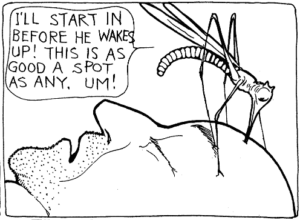By Debbie Burke
Like mosquitos in summer, scammers keep buzzing in with new tricks to suck the blood from writers. Here are three that recently hit my radar:
Scam #1 – We Pay You to Write!
A couple of months ago, several members of the Authors Guild received emails from individuals claiming to need articles or workbooks written for an upcoming seminar. The bait is a substantial fee and a promise of wider recognition through their organization. They may claim to have a disability, with the inference that if you write for them, you also enjoy the satisfaction of helping. Or…if you don’t write for their worthy cause, you should feel guilty. Con artists are masters at manipulation.
Here’s a sample invitation from “Paula Smith”:
Hello, My name is Paula, an academic consultant. I have a speech distorting condition called Apraxia. I got your contact details online and I need your service. Can you write an article on a specific topic for an upcoming workshop? The article is to be given as a handbook to the attendees of the workshop. I have a title for the article and have drafted an outline to guide you. Please get back to me for more information
(442) 278-5255
Paula
Fortunately, the author who received the solicitation investigated a little deeper and discovered “Paula’s” phone number had numerous complaints against it for fraud. A helpful resource to check out questionable phone numbers is callername.com.
More writers added their suspicions to the Authors Guild discussion group but weren’t sure how the scam worked.
Then AG member and travel writer Lan Sluder offered the following enlightening explanation:
|
Another AG poster who’s a member of the American Translators Association added that their members have also been targeted and shared the story of one victim. The scammer “overpaid” then asked the translator to wire money for the refund. Unfortunately, she did, shortly before the scam check bounced and she was out $2000.
Ouch!
Scam #2 – Fake Marketing Offers
These scammers keep reinventing themselves with different aliases and websites. Be wary of anyone who calls out of the blue or sends an email with wording similar to this:
Dear Author,
Our expert book scouts discovered your fabulous novel and we are excited to offer you an amazing opportunity. Because we believe so strongly in the bestseller potential of your book, we want to invest [fill in outrageous amount of money] in your marketing and publicity at absolutely no cost to you. We will reserve a place of honor for your book at the upcoming [fill in prestigious book fair or festival]. Your success will be our reward.
Sincerely,
A Company That Believes in Your Fantastic Talent (smirking)
After a few more flattering emails, they swoop in for the kill shot:
We reaffirm you do not have to pay one penny for our fabulous marketing package because our faith in you is so strong. To be fair, we know you’ll want to contribute your part by paying the bargain registration fee of only [fill in hundreds to thousands of dollars].
Here’s a post from YA author Khristina Chess who was contacted by Readers Magnet. Interestingly, they claim to be accredited by the Better Business Bureau as of 2019. However this BBB link shows multiple complaints against them.
 Here’s a list of companies that engage in practices that may technically be within the law but slide into slimy.
Here’s a list of companies that engage in practices that may technically be within the law but slide into slimy.
Before you engage any writing-related services, check them out on Writer Beware whose mission is: “Shining a bright light into the dark corners of the shadow-world of literary scams, schemes, and pitfalls.”
A big thank you to Writer Beware for watching out for writers!
Scam #3 – Impersonating Agents and Editors
Earlier this year, intrepid Victoria Strauss covered cases of scammers who assume the identity of legitimate agents or editors then contact unsuspecting authors. Of course, struggling writers are understandably thrilled to have a big-name agent contact them. Just be sure the person is who they claim to be. Here’s Victoria’s post.
On July 16, agent Victoria Marini @LitAgentMarini tweeted the following warning after learning someone had co-opted her name:
“It has come to my attention that someone is impersonating me online, likely in an attempt to scam writers. I am not associated with WritersDesk LLC, nor do I sell videos, materials, editorial work, or any other good or service. Many thanks to @victoriastrauss.”
Protect yourself from true crimes against writers. Always verify the source.
~~~
TKZers: Have you been solicited by questionable people or companies regarding your writing? Please share your experience and outcome.
~~~
Check out a devious scam with a unique twist in Debbie Burke’s thriller, Stalking Midas, available at this link.


